The product recommendations in this post are recommendations by the writer and/or expert(s)
interviewed and do not contain affiliate links. Meaning: If you use these links to buy
something, we will not earn a commission.
In the last decade, you have no doubt seen the explosion of yogurt options available at the grocery store. While many of the traditional options of years past are still available, Greek yogurt has become a popular variety that’s been taking up an increasing amount of shelf space. This type of yogurt has gained popularity because of its stellar nutritional composition as well as its unique textural and flavor characteristics. Greek yogurt is much higher in protein and has a thicker texture than traditional yogurts. It also happens to have a natural tanginess and is much more tart than the sugary yogurt you may have grown up with.
Similar to other yogurts, Greek yogurt contains many essential nutrients. This convenient meal and snack food is a source of B vitamins and the antioxidant selenium. It also contains calcium, potassium, and vitamin D. You’ll find varying amounts of fat in Greek yogurt, and the flavors, toppings, and mix-ins will influence the amount of carbs and sugar in your yogurt selection.
Because there are now so many different types of yogurts in stores, it’s hard to tell which is the best Greek yogurt from a nutritional perspective, which is why we looked through countless offerings to determine the healthiest and unhealthiest options you can buy.
How to pick the healthiest Greek yogurt
When navigating the countless yogurt options at the store, things can get tricky. Here is how to narrow down the healthiest selections.
- Check out the sugar content. While there is some natural sugar in Greek yogurt due to its milk base, added sugar should be limited. Look for fewer than 5 grams of added sugar per serving. The lower, the better.
- Avoid artificial sweeteners. Ingredients like sucralose and aspartame contribute zero calories to your yogurt, but they may be questionable for your health. Options made with monk fruit and stevia provide sweetness without any added calories or sugar and have less questionable research associated with them.
- Look for live cultures. The healthy bacteria in yogurt, also known as probiotics, are referred to as live cultures. Probiotics serve numerous functions in your body and are used to turn milk into yogurt. However, processing practices can kill the bacteria. Look for options with live and active cultures listed to ensure probiotic content.
Read on to learn more about the best Greek yogurt brands as well as which options you shouldn’t include in your meal plan. And for more, don’t miss 13 Unhealthiest Yogurts on Grocery Store Shelves.
The 6 best Greek yogurt brands
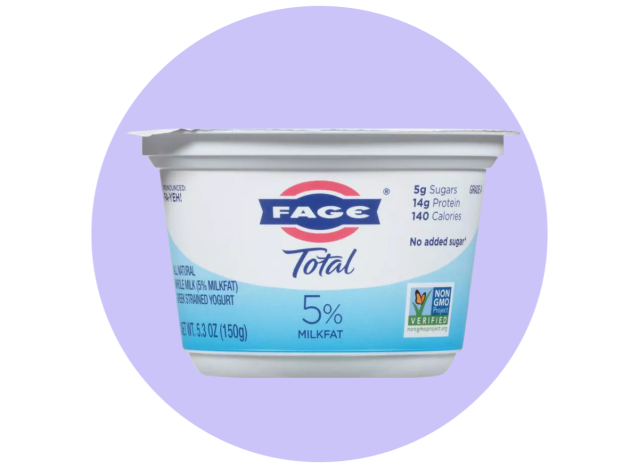

Per 5.3 oz cup: 140 calories, 8g fat (5 g saturated fat), 55 mg sodium, 5 g carbs (0 g fiber, 5 g sugar), 14 g protein
Plain yogurt is a good selection because it does not contain any added sugar or artificial sweeteners. With 14 grams of protein per serving, Fage Total 5% makes for a no-prep protein source that can easily be incorporated into meals and snacks. While lower fat and non-fat options are available, the 5% milkfat option may be more filling as fat has some satiety value. However, if you want to save your fat grams for a nut topping, go with non-fat plain Greek yogurt instead.


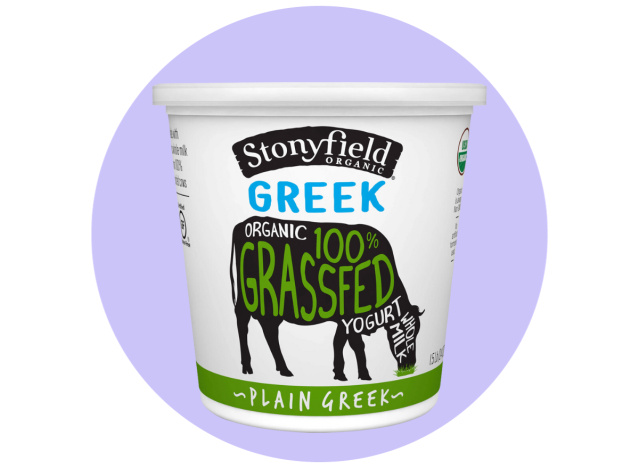

Per ¾ cup: 150 calories, 6g fat (3.5 g saturated fat), 65 mg sodium, 7 g carbs (0 g fiber, 5 g sugar), 16 g protein
Another whole milk option, Stonyfield Organic 100% Grassfed Greek Whole Milk Yogurt is made using milk from 100% grass-fed cows and is certified USDA organic. This means ingredients in this product have met the strict standards for the growing, processing, and handling of their products. While this doesn’t automatically make Greek yogurt a healthy option, it does emphasize natural processes and ingredients. No added sugar and high protein content also make this option a “best” Greek yogurt on our list.
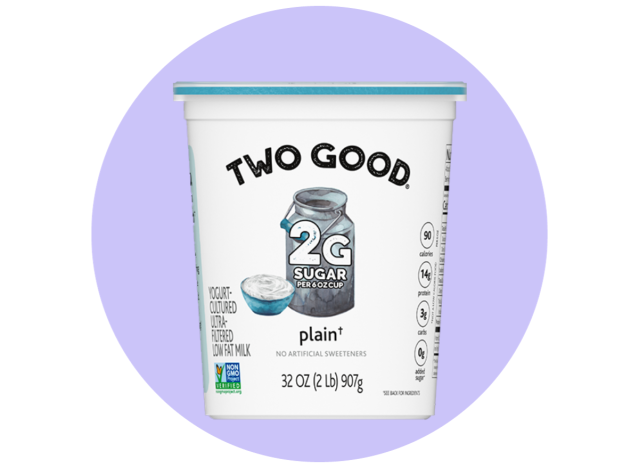

Per ¾ cup: 90 calories, 2g fat (1 g saturated fat), 30 mg sodium, 3 g carbs (0 g fiber, 2 g sugar), 14 g protein
With one of the lowest sugar contents on this list, Two Good Plain Greek Lowfat Yogurt makes a great option. This plain variety contains no added sugar and only 2 grams of natural sugar from the milk. If you prefer flavored options, this brand makes several options that are even lower in sugar than some plain Greek yogurt varieties. Fruit purees and stevia leaf provide sweetness in the flavored options without any added sugar.
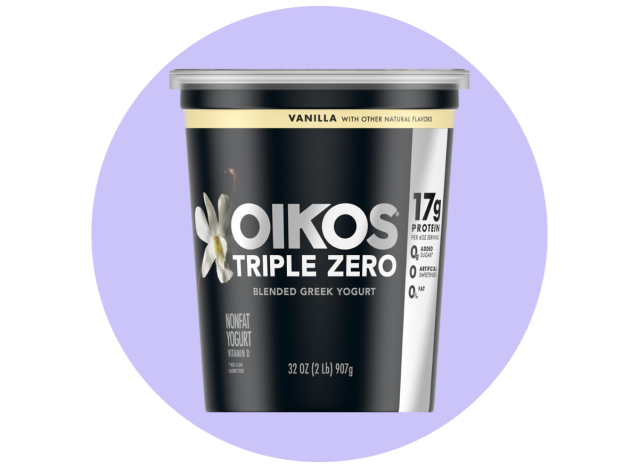

Per ¾ cup: 100 calories, 0g fat (0 g saturated fat), 65 mg sodium, 8 g carbs (0 g fiber, 6 g sugar), 17 g protein
At 17 grams per serving, Oikos Triple Zero Vanilla provides the most protein on our “best” list. Protein increases your feeling of fullness, helping this option make the list. This option contains stevia as a zero-calorie sweetener, providing sweetness without the sugar. Plus, zero grams of fat makes this a lower calorie option compared to others. The Triple Zero line of Greek yogurts is made without any added sugar, no artificial sweeteners, and contains 0% fat.
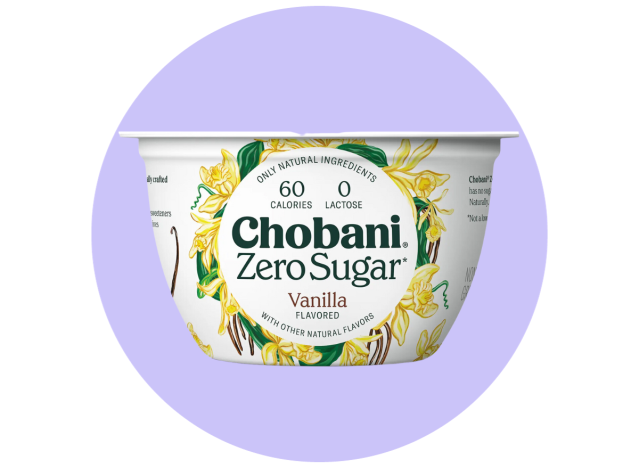

Per ¾ cup: 70 calories, 0g fat (0 g saturated fat), 70 mg sodium, 6 g carbs (<1 g fiber, 0 g sugar), 13 g protein
READ RELATED: 5 Ways to Spot Cancer Early and Improve Chances of Survival
Another non-fat option, the Chobani Zero Sugar line is made with no added sugar and no lactose. This allows for zero grams of sugar in the product. There are many flavors to choose from, many of which are fruit-based, while others will remind you of your favorite treats. Allulose and stevia provide the sweetness in this yogurt, both of which are sugar alternatives. At only 70 calories per serving, this variety still packs 13 grams of protein, making it a good option.
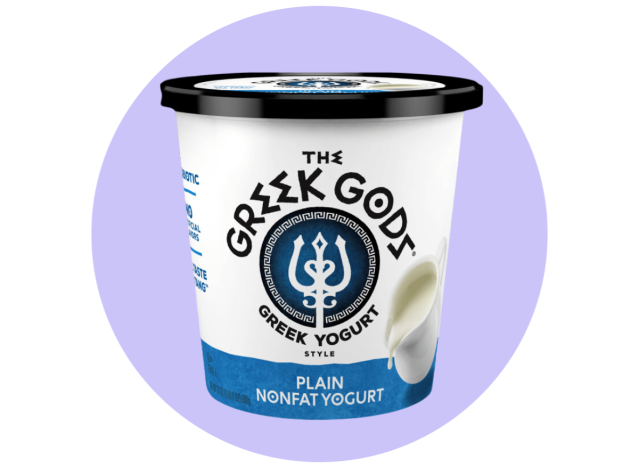

Per 1 cup: 100 calories, 0g fat (0 g saturated fat), 140 mg sodium, 14 g carbs (0 g fiber, 12 g sugar), 10 g protein
Although this option has fewer grams of protein and more carbs than others in the “best” category, The Greek Gods Plain Nonfat Yogurt provides 25% of the daily value of calcium and is known for a less tangy flavor than other plain Greek yogurts. This flavor profile may appeal to more people, and 10 grams of protein per serving is a great amount for a snack and can contribute to a balanced meal.
The 6 worst Greek yogurt brands
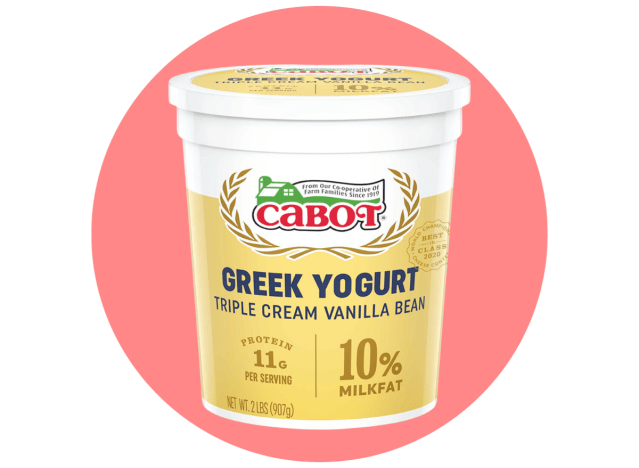

Per serving: 260 calories, 13g fat (8 g saturated fat), 65 mg sodium, 26g carbs (0g fiber, 21g sugar), 11g protein
Amongst the worst Greek yogurts on our list, you’ll find sugar content to be much higher than the best options. This yogurt option, Cabot Triple Cream Vanilla Bean Greek Yogurt, holds true to that characterization with the highest sugar content on this list. Not to mention, it also provides 13 grams of fat, 8 of which are saturated. Eating too much of this type of fat can raise cholesterol levels and increase your risk for heart disease and stroke.
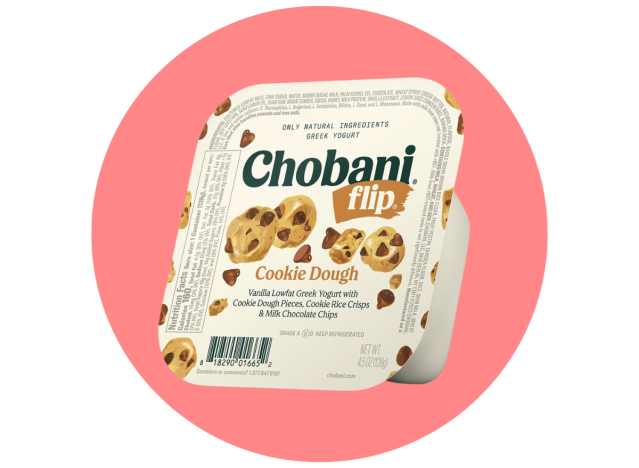

Per 4.5 oz: 160 calories, 4.5g fat (3 g saturated fat), 55 mg sodium, 21g carbs (<1g fiber, 19g sugar), 9g protein
If your Greek yogurt comes with toppings or mix-ins, it likely has added sugar. With a high sugar content and the lowest protein amount on this list, you’re better off skipping Chobani® Flip® Cookie Dough. Instead of this option, go with the Chobani Zero Sugar line and add your own toppings, like fresh fruit and nuts to avoid added sugar.
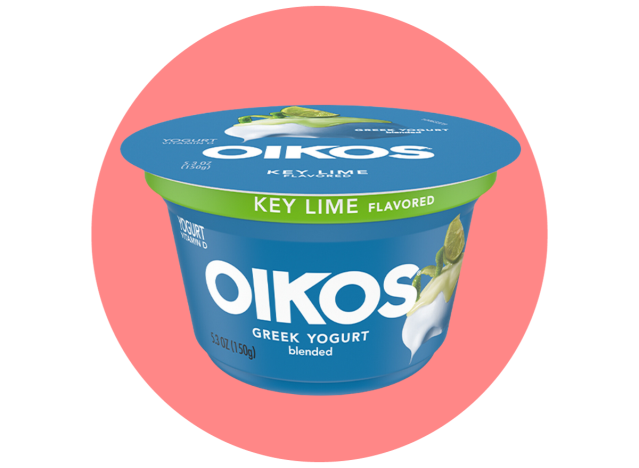

Per 1 cup: 140 calories, 4g fat (2.5 g saturated fat), 75 mg sodium, 16g carbs (0g fiber, 15g sugar), 11g protein
With 15 grams of total sugar and 10 grams of added sugar, Oikos® Key Lime Traditional Greek Yogurt makes our “worst” list. Some of the sugar in yogurt occurs naturally from milk, but you should keep an eye out for added sugar. This nutrient could increase your risk of diabetes, CVD, certain cancers, and other chronic diseases if consumed in too high amounts. Swap this flavored option for a plain variety, or the Triple Zero line.


Per 1 container: 130 calories, 2.5g fat (1.8 g saturated fat), 75 mg sodium, 14g carbs (0g fiber, 11g sugar), 11g protein
Although the toppings in Dannon Light + Fit Greek Crunch Peanut Butter Delight no doubt add a nice texture, they also boost the sugar in this product to 11 grams. While some sugar can be part of a balanced diet, it is best to limit it as much as possible. Although 130 calories can fit well into a snack, you are better off swapping the candy topping for a homemade mix-in. Instead of peanut butter cups, add a drizzle of peanut butter to your plain yogurt with a small sprinkle of dark chocolate chips. This will be lower in sugar while providing similar flavors.
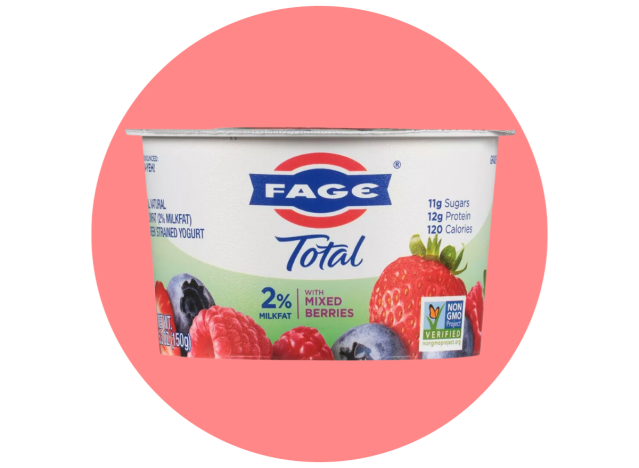

Per 1 container: 120 calories, 2.5g fat (1.5 g saturated fat), 40 mg sodium, 13g carbs (0g fiber, 11g sugar), 12g protein
Don’t let the fruit in Fage Total 2% Mixed Berries fool you, it still comes along with 7 grams of added sugar. While not the highest on this list, added sugar is an empty source of calories that is unlikely to contribute to your feeling of fullness after eating. In fact, the second ingredient listed in the berry mixture is cane sugar, even before the actual fruit! Add your own fresh or frozen fruit when possible to boost nutrients without added sugar.
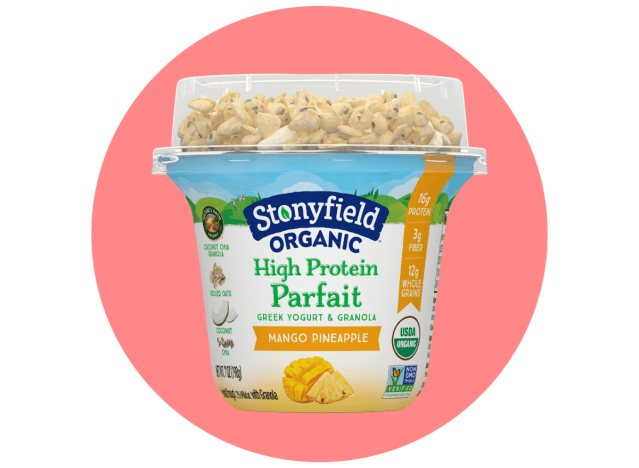

Per 1 tub: 260 calories, 8g fat (4 g saturated fat), 70 mg sodium, 30g carbs (3g fiber, 17g sugar), 16g protein
At 260 calories and 17 grams of sugar per serving, skip adding Stonyfield Organic Protein Greek Yogurt Mango Pineapple Parfait & Granola to your grocery cart. Not only would a 260-calorie snack be too high for what many people need, but the 10 grams of added sugar is equivalent to that found in about 2.5 teaspoons of sugar. This option does provide 3 grams of fiber, which is a positive, but it doesn’t outweigh the calorie, saturated fat, and sugar content. You’re better off getting fiber from fruits, nuts, and seeds added at home.










